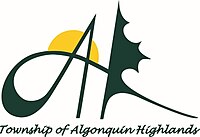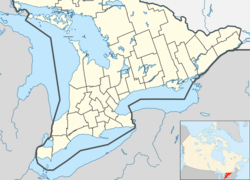Algonquin Highlands
Algonquin Highlands | |
|---|---|
| Township of Algonquin Highlands | |
 | |
| Coordinates: 45°24′N 78°45′W / 45.400°N 78.750°W | |
| Country | |
| Province | |
| County | Haliburton |
| Government | |
| • Type | Township |
| • Mayor | Liz Danielsen |
| • Federal riding | Haliburton—Kawartha Lakes—Brock |
| • Prov. riding | Haliburton—Kawartha Lakes—Brock |
| Area | |
| • Land | 1,007.20 km2 (388.88 sq mi) |
| Elevation | 443 m (1,453 ft) |
| Population (2016)[1] | |
• Total | 2,351 |
| • Density | 2.3/km2 (6/sq mi) |
| Time zone | UTC-5 (EST) |
| • Summer (DST) | UTC-4 (EDT) |
| Canadian postal code | K0M 1J0 |
| Area code | 705 |
| Website | www.algonquinhighlands.ca |

Algonquin Highlands is a township located in Haliburton County, Ontario, Canada. It has a population of 2,351. The northeastern section of the township is included in Algonquin Provincial Park.
The township was formed through the amalgamation of Stanhope and Sherborne et al. townships, the latter of which included McClintock, Livingstone, Lawrence and Nightingale. It was thereafter briefly known as the Township of Sherborne, Stanhope, McClintock, Livingstone, Lawrence and Nightingale until it was renamed to its current name in March 2001.
The township lacks a commercial center, but its municipal offices are located on North Shore Road, 5 km north of Carnarvon at 45°05′09″N 78°41′36″W / 45.08583°N 78.69333°W. A satellite municipal office is located in Dorset, the main street of which straddles the border of Algonquin Highlands to the east and Lake of Bays to the west.
Communities
[edit]The largest community in the Municipality of Algonquin Highlands is Dorset, Ontario although this community is actually split with Lake of Bays, Ontario.
Geography
[edit]Located in Algonquin Provincial Park, the area is characterized by uplands and dense transitional forestation. It rests on a portion of the Canadian Shield.[2]
Climate
[edit]Algonquin Highlands experiences a humid continental climate, with it being more cool due to the higher elevation.[3]
Demographics
[edit]In the 2021 Census of Population conducted by Statistics Canada, Algonquin Highlands had a population of 2,588 living in 1,269 of its 3,325 total private dwellings, a change of 10.1% from its 2016 population of 2,351. With a land area of 999.69 km2 (385.98 sq mi), it had a population density of 2.6/km2 (6.7/sq mi) in 2021.[4]
| 2021 | 2016 | 2011 | |
|---|---|---|---|
| Population | 2,588 (+10.1% from 2016) | 2,351 (+7.5% from 2011) | 2,186 (+9.1% from 2006) |
| Land area | 999.69 km2 (385.98 sq mi) | 1,007.2 km2 (388.9 sq mi) | 1,004.76 km2 (387.94 sq mi) |
| Population density | 2.6/km2 (6.7/sq mi) | 2.3/km2 (6.0/sq mi) | 2.1/km2 (5.4/sq mi) |
| Median age | 60.4 (M: 60.4, F: 61.2) | 59.0 (M: 58.8, F: 59.2) | |
| Private dwellings | 3,325 (total) 1,269 (occupied) | 3,453 (total) | 3,878 (total) |
| Median household income | $77,000 | $60,877 |
According to the Canada 2006 Census:[10]
- Mother tongue:
- English as first language: 92.1%
- French as first language: 1.3%
- English and French as first language: 0%
- Other as first language: 6.6%
| Year | Pop. | ±% |
|---|---|---|
| 1996 | 1,687 | — |
| 2001 | 1,827 | +8.3% |
| 2006 | 1,976 | +8.2% |
| 2011 | 2,186 | +10.6% |
| 2016 | 2,351 | +7.5% |
| [11][12][1] | ||
See also
[edit]References
[edit]- ^ a b c "Census Profile, 2016 Census: Algonquin Highlands, Township". Statistics Canada. 8 February 2017. Retrieved June 14, 2019.
- ^ "Natural History | Frontenac Arch Biosphere". www.frontenacarchbiosphere.ca. Retrieved 2022-10-09.
- ^ Canada, Environment and Climate Change (2013-09-25). "Canadian Climate Normals 1981-2010 Station Data - Climate - Environment and Climate Change Canada". climate.weather.gc.ca. Retrieved 2022-10-09.
- ^ "Population and dwelling counts: Canada, provinces and territories, census divisions and census subdivisions (municipalities), Ontario". Statistics Canada. February 9, 2022. Retrieved April 2, 2022.
- ^ "2021 Community Profiles". 2021 Canadian census. Statistics Canada. February 4, 2022. Retrieved 2023-10-19.
- ^ "2016 Community Profiles". 2016 Canadian census. Statistics Canada. August 12, 2021. Retrieved 2019-06-14.
- ^ "2011 Community Profiles". 2011 Canadian census. Statistics Canada. March 21, 2019. Retrieved 2012-02-13.
- ^ "2006 Community Profiles". 2006 Canadian census. Statistics Canada. August 20, 2019.
- ^ "2001 Community Profiles". 2001 Canadian census. Statistics Canada. July 18, 2021.
- ^ Statistics Canada 2006 Census - Algonquin Highlands community profile
- ^ Statistics Canada: 1996, 2001, 2006 census
- ^ "Algonquin Highlands census profile". 2011 Census of Population. Statistics Canada. Retrieved 2012-02-13.
- "Algonquin Highlands". Geographical Names Data Base. Natural Resources Canada. Retrieved 2010-07-12.
- "Topographic Map sheets 31E2 & 31E7". Atlas of Canada. Natural Resources Canada. 2006-02-06. Archived from the original on 22 January 2009. Retrieved 2008-12-15.



